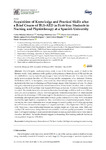Mostrar o rexistro simple do ítem
Acquisition of Knowledge and Practical Skills after a Brief Course of BLS-AED in First-Year Students in Nursing and Physiotherapy at a Spanish University
| dc.contributor.author | Méndez Martínez, Carlos | |
| dc.contributor.author | Martínez-Isasi, Santiago | |
| dc.contributor.author | García Suárez, Mario | |
| dc.contributor.author | De la Peña Rodríguez, Medea | |
| dc.contributor.author | Gómez Salgado, Juan | |
| dc.contributor.author | Fernández-García, Daniel | |
| dc.date.accessioned | 2019-08-27T11:31:24Z | |
| dc.date.available | 2019-08-27T11:31:24Z | |
| dc.date.issued | 2019 | |
| dc.identifier.citation | Méndez-Martínez, C.; Martínez-Isasi, S.; García-Suárez, M.; De La Peña-Rodríguez, M.A.; Gómez-Salgado, J.; Fernández-García, D. Acquisition of Knowledge and Practical Skills after a Brief Course of BLS-AED in First-Year Students in Nursing and Physiotherapy at a Spanish University. Int. J. Environ. Res. Public Health 2019, 16, 766. https://doi.org/10.3390/ijerph16050766 | es_ES |
| dc.identifier.issn | 1660-4601 | |
| dc.identifier.uri | http://hdl.handle.net/2183/23870 | |
| dc.description.abstract | [Abstract] Out-of-hospital cardiorespiratory arrest is one of the leading causes of death in the Western world. Early assistance with quality Cardiopulmonary Resuscitation (CPR) and the use of a defibrillator may increase the percentage of survival after this process. The objective of this study was to evaluate the effect of CPR training and the management of an Automatic External Defibrillator (AED). A descriptive, cross-sectional, observational study was carried out among students in the first year of a Nursing and Physiotherapy degree of the University of León. To achieve this goal, a theoretical-practical educational intervention of four hours’ duration which included training on CPR, AED and Basic Life Support (BLS) was carried out. A total of 112 students were included. The results showed an increase in theoretical knowledge on BLS as well as on CPR and AED, and practical skills in CPR and AED management. A theoretical exposition of fifteen minutes and the practical training of CPR wasenough for the students to acquire the necessary theoretical knowledge, although the participants failed to reach quality criteria in CPR. Only 35.6% of students reached the right depth in compressions. Also, ventilation was not performed properly. Based on the results, we cannot determine that the percentage of overall quality of CPR was appropriate, since 57.6% was obtained in this respect and experts establish a value higher than 70% for quality CPR. There was a clear relationship between sex, weight, height and body max index (BMI), and quality CPR performance, being determinant variables to achieve quality parameters. Currently, Basic Life Support training in most universities is based on training methods similar to those used in the action described. The results obtained suggest implementing other training methods that favour the acquisition of quality CPR skills | es_ES |
| dc.language.iso | eng | es_ES |
| dc.publisher | MDPI | es_ES |
| dc.relation.uri | https://doi.org/10.3390/ijerph16050766 | es_ES |
| dc.rights | Atribución 4.0 Internacional | es_ES |
| dc.rights.uri | http://creativecommons.org/licenses/by/4.0/ | * |
| dc.subject | Cardiopulmonary resuscitation | es_ES |
| dc.subject | CPR | es_ES |
| dc.subject | Basic Cardiac Life Support | es_ES |
| dc.subject | Nursing students | es_ES |
| dc.subject | Training | es_ES |
| dc.title | Acquisition of Knowledge and Practical Skills after a Brief Course of BLS-AED in First-Year Students in Nursing and Physiotherapy at a Spanish University | es_ES |
| dc.type | info:eu-repo/semantics/article | es_ES |
| dc.rights.access | info:eu-repo/semantics/openAccess | es_ES |
| UDC.journalTitle | International Journal of Environmental Research and Public Health | es_ES |
| UDC.volume | 16 | es_ES |
| UDC.issue | 5 | es_ES |
| UDC.startPage | 766 | es_ES |
| UDC.endPage | 778 | es_ES |
| dc.identifier.doi | 10.3390/ijerph16050766 | |
| dc.identifier.doi | 10.3390/ijerph16050766 |
Ficheiros no ítem
Este ítem aparece na(s) seguinte(s) colección(s)
-
II - Artigos [434]






